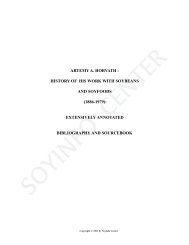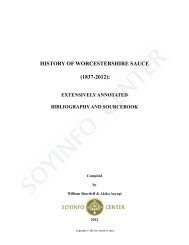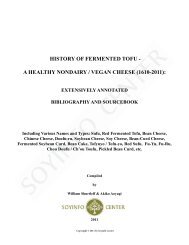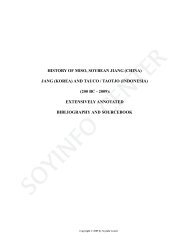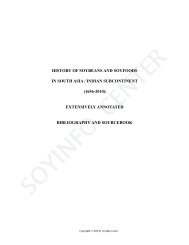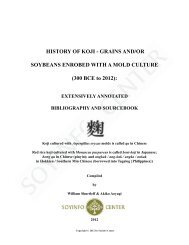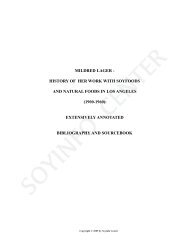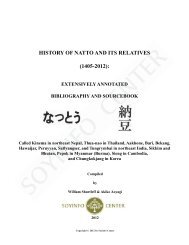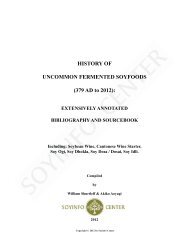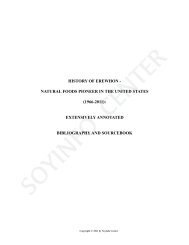history of soy yogurt, soy acidophilus milk and other ... - SoyInfo Center
history of soy yogurt, soy acidophilus milk and other ... - SoyInfo Center
history of soy yogurt, soy acidophilus milk and other ... - SoyInfo Center
Create successful ePaper yourself
Turn your PDF publications into a flip-book with our unique Google optimized e-Paper software.
home. SoyaCow project. Literacy. Women’s program). How<br />
you can help (Donating. Volunteering. Sponsorship. Support<br />
groups. Corporate support. Supplies. Wall <strong>of</strong> honour). Intern<br />
(Since 1985 about 1,000 interns have volunteered for 3+<br />
months in India or Nepal).<br />
“Inspired by the ideals <strong>and</strong> philosophy <strong>of</strong> Mahatma<br />
G<strong>and</strong>hi, Child Haven International is a registered charity<br />
founded in 1985. We assist children <strong>and</strong> women in<br />
developing countries, who are in need <strong>of</strong> food, education,<br />
health care, shelter <strong>and</strong> clothing, emotional <strong>and</strong> moral<br />
support.”<br />
G<strong>and</strong>hian ideals: 1. No recognition <strong>of</strong> caste. 2. Equality<br />
<strong>of</strong> the sexes. 3. Non-violence (toward both humans <strong>and</strong><br />
animals). 4. Vegetarian meals (The meals are rice <strong>and</strong> lentils<br />
<strong>and</strong> vegetables, with some <strong>soy</strong>a <strong>milk</strong> <strong>and</strong> yoghurt from<br />
our SoyaCow machines, which were invented by Raj <strong>and</strong><br />
Rashmi Gupta <strong>of</strong> Ottawa, Canada). 5. Respect for religious<br />
background. 6. Simple living (Each child has a little metal<br />
suitcase. All their worldly goods have to fi t inside, <strong>and</strong> they<br />
do–very nicely).<br />
Child Haven’s SoyaCow project: “The SoyaCow<br />
machine is capable <strong>of</strong> making three gallons <strong>of</strong> <strong>soy</strong>a <strong>milk</strong> in<br />
30 minutes from 1.7 kg. <strong>of</strong> raw <strong>soy</strong>beans. The technology<br />
was developed by ProSoya Foods Ltd., a group <strong>of</strong> Ottawa<br />
scientists <strong>and</strong> entrepreneurs. The SoyaCow machine is<br />
used in Child Haven homes to produce Soya <strong>milk</strong> <strong>and</strong> Soya<br />
products for the children. It’s also sold to economically<br />
disadvantaged women for their use as a cottage industry.<br />
“In 1988 a SoyaCow Support Group was formed <strong>and</strong><br />
by 1992 Child Haven International had purchased six<br />
SoyaCow machines. Child Haven received funding for<br />
this environmentally friendly project from The Canadian<br />
International Development Agency (CIDA). There are now<br />
400 SoyaCow machines in India <strong>and</strong> it is being promoted<br />
in Africa. Charitable donations <strong>and</strong> fundraising events<br />
provided Child Haven’s contribution to the promotion <strong>of</strong> the<br />
SoyaCow.<br />
“SoyaCow technology produces a palatable, highly<br />
nutritious, cereal or almond fl avoured <strong>milk</strong> without<br />
cholesterol. The <strong>milk</strong> <strong>and</strong> okara mash can then be used to<br />
produce <strong>other</strong> <strong>soy</strong>a products such as <strong>yogurt</strong>, t<strong>of</strong>u <strong>and</strong> vada.<br />
One machine can produce sixteen-three gallon batches in an<br />
eight hour day–equivalent <strong>of</strong> a herd <strong>of</strong> 16 cows in India.<br />
“SoyaCow machines are used in Child Haven homes<br />
in Kathm<strong>and</strong>u, Bangladesh, Hyderabad <strong>and</strong> Kaliyampoondi<br />
because <strong>soy</strong> <strong>milk</strong> is a low cost, high protein product which is<br />
cheaper to produce than cow’s <strong>milk</strong>. From a given acreage,<br />
ten times as much <strong>soy</strong> <strong>milk</strong> can be produced at one third<br />
to one half the price <strong>of</strong> cow’s <strong>milk</strong>. Soy <strong>milk</strong> made on the<br />
premises <strong>of</strong> schools <strong>and</strong> homes is safe from contamination<br />
by dilution with water. It is also free from the danger <strong>of</strong><br />
transmitting tuberculosis or <strong>other</strong> diseases from infected<br />
cows.<br />
“In addition to the health benefi ts <strong>of</strong> <strong>soy</strong>a <strong>milk</strong>, Child<br />
HISTORY OF SOY YOGURT & CULTURED SOYMILK 523<br />
© Copyright Soyinfo <strong>Center</strong> 2012<br />
Haven’s SoyaCow Project has generated employment for<br />
women. These women are trained to operate the SoyaCow<br />
machines <strong>and</strong> sell the <strong>soy</strong>a <strong>milk</strong> products, thereby achieving<br />
some economic self suffi ciency <strong>and</strong> generating revenue<br />
which can be used for the benefi t <strong>of</strong> their children.” Address:<br />
Farmhouse, Maxwell, Ontario, Canada.<br />
1353. Sharma, Ratan. 2010. Re: Statistics on production <strong>of</strong><br />
<strong>soy</strong><strong>milk</strong> in India in 2008. Letter (e-mail) to William Shurtleff<br />
at Soyinfo <strong>Center</strong>, Oct. 15. 2 p.<br />
• Summary: As an attachment to an e-mail, Ratan sends<br />
an Excel spreadsheet titled “Soya <strong>milk</strong> production in<br />
India,” which he developed in Sept. 2008. The purpose<br />
was to estimate the amount <strong>of</strong> <strong>soy</strong><strong>milk</strong> produced in India<br />
at that time. Most <strong>of</strong> the companies are small, independent<br />
commercial producers, however at least 6 Child Haven<br />
International (CHI) centers <strong>and</strong> several university <strong>and</strong><br />
governmental research centers have been included.<br />
Moreover, 4 <strong>of</strong> the producers are in Nepal (an independent<br />
country just north <strong>of</strong> India), <strong>and</strong> the last entry under<br />
“Companies” is “Other <strong>soy</strong><strong>milk</strong> producers.” This fi gure for<br />
<strong>soy</strong><strong>milk</strong> includes <strong>soy</strong><strong>milk</strong> that is transformed into t<strong>of</strong>u or <strong>soy</strong><br />
<strong>yogurt</strong>.<br />
The spreadsheet has the following columns: (1)<br />
Company name <strong>and</strong> city. (2-4) Number <strong>of</strong> batches per day,<br />
month <strong>and</strong> year. (5-7) Soya <strong>milk</strong> production (in liters) per<br />
day, month, <strong>and</strong> year. (8-10) Soyabean utilization per day<br />
<strong>and</strong> month (in kg) <strong>and</strong> per year (in 1,000 metric tons).<br />
A total <strong>of</strong> 167 specifi c companies are listed, including<br />
two large companies (ProSoya Foods, <strong>and</strong> Godrej Foods)<br />
that sell their <strong>soy</strong><strong>milk</strong> in aseptic Terabrik cartons.<br />
The estimated total <strong>soy</strong><strong>milk</strong> production in India (<strong>and</strong><br />
Nepal) is 63,767 liters per day, 1.91 million liters per month,<br />
<strong>and</strong> 22.95 million liters per year.<br />
Of this total, ProSoya Foods makes 4.789 million liters<br />
per year, <strong>and</strong> Godrej Foods makes 5.086 million liters per<br />
year. Together, these two large Tetra Pak companies make<br />
9.875 million liters or 42.6% <strong>of</strong> the total.<br />
The “Other <strong>soy</strong><strong>milk</strong> producers” make a total <strong>of</strong> 810,000<br />
liters per year, which is 3.5% <strong>of</strong> the gr<strong>and</strong> total.<br />
The total estimated <strong>soy</strong>bean utilization is 255,060 kg<br />
(255 metric tons) per month, <strong>and</strong> 3.060 million metric tons<br />
per year. The single largest non-Tetra Pak <strong>soy</strong><strong>milk</strong> maker on<br />
this table is Dr. Pathak (in Meerut, Uttar Pradesh, in northern<br />
India). His company uses 5 SoyaCows to make 255 batches<br />
<strong>of</strong> <strong>soy</strong><strong>milk</strong> per day. That works out to 3,825 liters per day,<br />
<strong>and</strong> 1.377 million liters per year.<br />
The #2 largest non-Tetra Pak <strong>soy</strong><strong>milk</strong> maker on this<br />
table is Rubal Soya (in Distt. Sangroor, Ludhiana, Punjab);<br />
contact person Kuldeep Singh Cheema. They use 3<br />
SoyaCows to make 125 batches per day. That works out to<br />
1,875 liters per day (<strong>of</strong> fl avored <strong>soy</strong><strong>milk</strong>), <strong>and</strong> 675,000 liters<br />
per year. Plus 200 kg <strong>of</strong> t<strong>of</strong>u, <strong>and</strong> 25 kg <strong>of</strong> <strong>soy</strong> nuts.<br />
Letter (e-mail) from Ratan Sharma. 2010. Oct. 27. He



